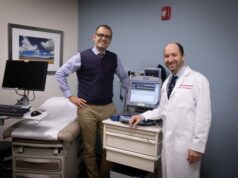Boston Scientific Europe has announced the launch of the HeartLogic Heart Failure Diagnostic in Europe. With this launch, the first and only diagnostic tool that enables proactive heart failure (HF) care is now available for patients in select countries across Europe including Italy, Spain, UK, Germany, Austria and Switzerland, with more to follow in the coming months.
At present, heart failure affects more than 15 million people in Europe and accounts for approximately 3 million hospitalisations and numerous deaths each year.[1] The HeartLogic diagnostic provides continuous measurement of early worsening signs of heart failure by combining data from sensors evaluating heart sounds, respiration rate and volume, thoracic impedance, heart rate and activity. HeartLogic’s unique algorithm is built into the Resonate and next generation Cardiac Resynchronisation Therapy Defibrillators (CRT-Ds) and implantable cardiac defibrillators (ICDs).
The Multisensor Chronic Evaluation in Ambulatory Heart Failure Patients (MultiSENSE) study evaluated the performance of the HeartLogic Diagnostic to predict impending heart failure (HF) decompensation. In the MultiSENSE study, HeartLogic proved to successfully detect 70% of heart failure events in advance, providing physicians with several weeks of notice in most cases.[2]
“Using the HeartLogic Heart Failure Diagnostic, physicians can detect early warning signs of heart failure symptoms worsening, which gives them valuable time to address the different pathophysiological aspects of heart failure, adjust treatment, avoid potential re-hospitalisations and ultimately improve overall patient care and outcomes,” said John P Boehmer, principal investigator and director of the Heart Failure Program at Penn State Health Milton S. Hershey Medical Centre and professor of medicine, Penn State College of Medicine, USA.
At the Heart Failure Congress 2018 in Vienna (May 26–29), several new analyses from the MultiSENSE Study have been presented. The data revealed that HeartLogic may detect changes in rapid shallow breathing patterns and may thus enable better outcomes for HF patients:
- Changes in the Rapid Shallow Breathing Index (RSBI) correlated with changes in patients’ dyspnoeic status. For example, increased rapid shallow breathing resulted in a worsening dyspnoea status whereas minute ventilation (MV), a common marker known to be elevated in HF patients, did not.[3]
- The device-measured RSBI showed to be significantly elevated in the three-day period preceding HF events, whereas MV did not show significant differences.[4]
- Readmissions or death were more likely when the device-measured RSBI worsened during heart failure hospitalisation.[5]
In addition:
- HeartLogic has proven robust to various patient demographics. The algorithm works effectively across different patient body types and for patients of different ethnicities.
- Analysis of heart sound recording during echo evaluation in a patient with atrial fibrillation (AF) confirmed the presence of the third heart sound (S3). A device-based objective measure may thus provide more consistent assessment of S3 than auscultation in the midst of an arrhythmic rumble of AF.
[1] Westenbrink BD et al. Heart failure specialization in Europe. European Journal of Heart Failure (2016) 18, 347–349.
[2] Boehmer, J et al., A Multisensor Algorithm Predicts Heart Failure Events in Patients With Implanted Devices: Results From the MultiSENSE Study. JACC Heart Failure, 2017;5(3), 216-225.
[3] Behmer, J et al., Device Measured Rapid Shallow Breathing Index and Not Minute Ventilation Reflects Changes in Dyspnea Status in Ambulatory Heart Failure Patients [abstract]. At: Heart Failure 2018 & World Congress on Acute Heart Failure 2018; May 26-29; Vienna.
[4] Boehmer, J et al., Device Measured Rapid Shallow Breathing Index Reflects Changing Respiratory Patterns but Minute Ventilation Reflects Changing Activity During Worsening Heart Failure in Ambulatory Patients [abstract]. At: Heart Failure 2018 & World Congress on Acute Heart Failure 2018; May 26-29; Vienna.
[5] Lindenfeld, J et al. Readmissions or Death are More Likely When Device-Derived Rapid Shallow Breathing Index Worsens During Heart Failure Hospitalization [abstract]. At: Heart Failure 2018 & World Congress on Acute Heart Failure 2018; May 26-29; Vienna.












